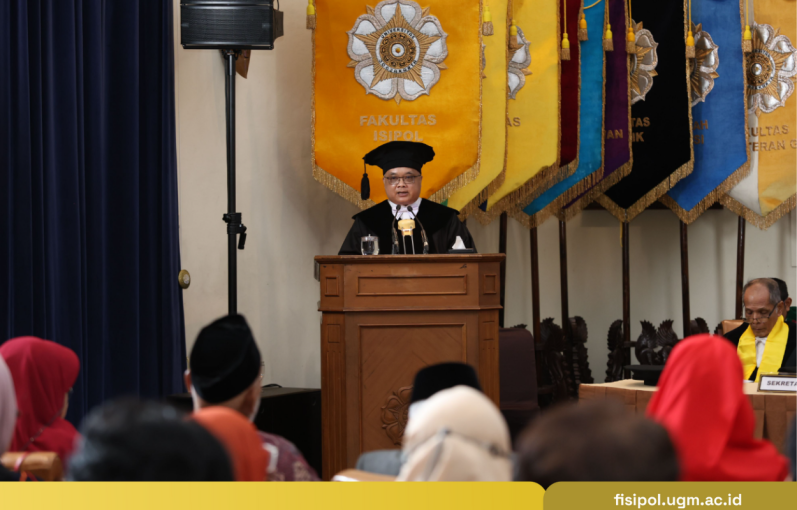
Yogyakarta, 24 July 2025 — Prof. Dr. Nur Rachmat Yuliantoro was officially inaugurated as a Full Professor in East Asian International Development at the Faculty of Social and Political Sciences, Universitas Gadjah Mada. In his inaugural speech, he addressed the issue of loans and national debt within China’s Belt and Road Initiative (BRI), which continues to spark debate over Indonesia–China relations. Prof. Rachmat offered a broad and critical perspective, raising concerns over financial risk and national stability.
Prof. Rachmat described Indonesia’s foreign debt to China as a “Gordian knot”—a complex issue that cannot be untangled using conventional approaches. He explained that the situation reflects a tangled web of economic dependence, territorial sovereignty challenges, and the political interests of domestic elites.
“In this context, Indonesia is not only facing financial challenges in funding its development, but also navigating significant political and security threats. That’s why we must better understand the dynamics of bilateral relations and exercise greater caution in our foreign policy choices,” he stated on Thursday (24/7).
He emphasized that national development should serve the public good. Unfortunately, development strategies often rely heavily on modernization, which risks overlooking local values. One of the recurring challenges is structural inequality in the global economy, where developed nations benefit disproportionately while developing countries struggle to achieve long-term growth. According to Prof. Rachmat, such inequality constitutes a new form of colonialism that keeps developing nations dependent on global capitalist supply chains.
“This is where the idea of decolonization arises—to challenge Western dominance in knowledge production and methodologies through stronger collaboration among developing countries,” Prof. Rachmat explained. This spirit is reflected in various initiatives, such as South–South Cooperation. In Africa, for instance, China is a major donor of development funds and is seen as a collaborative international partner. Yet concerns persist over the “dependency” or debt traps associated with China’s financial involvement.
Similar concerns are also evident in China’s Belt and Road Initiative. BRI is a major strategic effort aimed at boosting infrastructure connectivity, trade flows, and economic integration between East Asia and other regions. Reports show that China sponsors at least 71 BRI projects worldwide. One of the most prominent in Indonesia is the high-speed Whoosh train project, initially valued at IDR 76.95 trillion. However, cost overruns pushed the final figure to IDR 114.1 trillion, forcing Indonesia to use state funds and incur hidden debts to China.
“There’s no denying that China’s large-scale investments have accelerated infrastructure development. But the growing dependence on China has raised widespread concerns,” Prof. Rachmat warned. He concluded that development policies must be guided by prudence—carefully considering risks to national security and long-term stability.
Prof. Rachmat is now one of the 538 active professors at UGM, and one of 23 among 39 professors ever appointed at FISIPOL UGM. Prof. Dr. M. Baiquni, M.A., Chair of the UGM Professors Council, congratulated Prof. Rachmat on his inauguration and praised his contributions to the field of international relations. He expressed hope that Prof. Rachmat’s scholarship would continue to enrich knowledge and benefit society.
